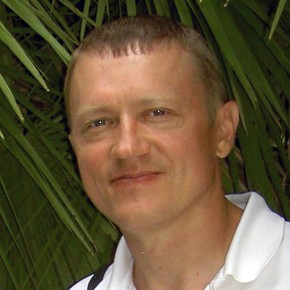Biography
In January 2020, peaceful believer Viktor Zimovskiy was summoned for interrogation, detained and sent to a pre-trial detention center for two months. Three months earlier, his home had been searched. In November 2022, the court sentenced this disabled father of three children to six years and two months in a penal colony.
Viktor was born in 1969 in the town of Georgievsk. His parents passed away, leaving the thirteen-year-old boy an orphan. The only relative that remained was his older sister, Yelena.
As a child, Viktor was fond of soccer, and he collected stamps and coins. After graduating eighth grade, he transferred to an evening school so he could earn extra money as a loader during the day. Viktor also worked as a mechanic and as a builder, and he finished apartments.
His older sister, Yelena, was the first to get acquainted with the Bible, and later Viktor joined her. While studying this book, he found the answer to the question that concerned him: What is the meaning of life? Viktor realized that death is not the end, and people have the hope of living forever in a paradise on earth.
Viktor met his wife, Nadezhda, in Georgievsk. In July 2006 they got married. Nadezhda worked as a manager in a computer equipment store and at the same time studied by correspondence at a university Department of Psychology. Now she takes care of her home; she likes to work in the garden and to take care of the plants, and she knits and embroiders. At the time of Viktor's arrest, their sons were aged twelve and five and Nadezhda was expecting their third child.
The family loves to spend time together, visit the sights of the Caucasus area, and take care of their garden.
Viktor's criminal prosecution divided the life of his family into "before" and "after." Since the search, the family has been under great stress.
Viktor has a disability, and he underwent heart surgery. His already fragile health suffered. A few days after the search, Viktor was hospitalized in the cardiology department for a serious condition, and Nadezhda was admitted to the hospital with a risk of miscarriage in the fifth month of pregnancy.
The children are sure that their father did nothing wrong. They don't understand why he is being treated like a criminal.
Viktor's relatives, friends, and colleagues, are very concerned about what is happening. They all know the Zimovskiys as law-abiding, respectable, and honest people, and they wonder how such unjust persecution is possible in modern society.
